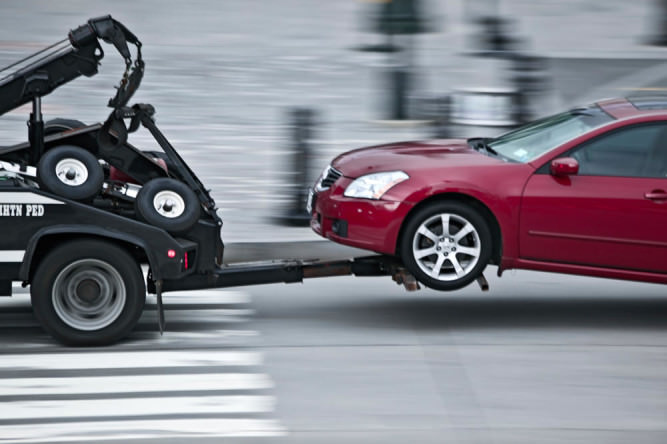
Towing vehicles from your condominium: Just how enforceable are your condominium association’s rules and regulations?
An old green sedan with chipped paint, no registration, a flat tire, and covered in a fine layer of dust and pollen. Can your condominium association legally tow it? The answer could very well be “yes,” even if your condominium does not have the specific authority to tow within its declaration of condominium. But what is required in order to safely tow? Let this article be your guide.
First and foremost, a few caveats: each condominium is different, and each condominium’s declaration is unique. As a general rule, “booting” or immobilization of a vehicle may be prohibited by your county. Also, certain signage with contact information for the towing company must be conspicuously posted in the complex. Thus, it is always a good idea to consult with your association’s legal counsel prior to towing any vehicle from the condominium. Now, formalities aside, let’s tow some cars . . . .
So, the most important issues to address when questioning whether your association can tow vehicles: 1) Does the association have the authority to tow? and 2) what type of notice is the association required to provide prior to towing?
Many modern condominium instruments will contain express authority to tow vehicles from the common elements for various reasons, including violations of the parking restrictions within the declaration itself, having expired tags, being inoperable, blocking fire lanes or other parking spaces, etc. Well drafted instruments will also include express authority for the association to tow vehicles of delinquent homeowners, which can be a very effective collection tool. However, many condominium’s governing documents do not contain explicit authority to tow, but instead may simply grant the association the authority to promulgate reasonable rules and regulations with regard to the use of the common elements. When done properly, this authority can create sufficient authority to tow. Better still, if your association creates rule-specific notice requirements, those requirements will supersede more general notice requirements that may be located elsewhere in your governing documents.
In 2006, the Georgia Court of Appeals upheld a condominium association’s right to create rules and regulations with regard to towing. In King v. Chism, a condominium association towed a 1979 Cadillac Seville that was owned by Mr. King due to violations of various parking rules and regulations that were created by the association. The association’s rules and regulations included several sections related to vehicles on the property, including rules that required vehicles parked in the complex to be “conventional, full bodied vehicles in good repair,” to have “current tags and stickers,” and the rules provided that “any violation of the vehicle rules can be cause for towing.” In violation of these rules, King was parking his 1979 green Cadillac Seville in the common parking area of his condominium. King’s registration was not current, he no longer maintained insurance on the vehicle, and the vehicle would not start. After giving him the notice set forth within the rules pertaining to towing of vehicles, the association towed the car.
King sued the association, and asserted that the association did not have authority to remove his vehicle from the premises. The association won, and King appealed. In his appeal, King argued that the trial court erred because “(1) the association did not have authority to promulgate a rule resulting in the confiscation of his car; and (2) the association did not comply with the due process requirements set forth in its bylaws” The Court of Appeals, however, disagreed.
The declaration of condominium in the case stated that owners and occupants shall comply strictly with the declaration, the bylaws, and the rules and regulations contained in or promulgated in accordance with the declaration or bylaws. Also, the bylaws states the board of directors shall manage the affairs of the association and shall have all the powers and duties necessary for the administration of the condominium, including the power to adopt rules and regulations as it deems necessary and appropriate and to impose sanctions for violations.
Note that no language within the declaration or bylaws granted the association explicit authority to tow vehicles. That language only appeared within the association’s rules and regulations. However, The Court of Appeals determined that the declaration itself contemplates the creation of rules and regulations in accordance with the declaration or bylaws and that owners shall comply with these rules. It noted that the Georgia Condominium Act also requires that unit owners comply with the association’s rules and regulations.
Another interesting point is related to King’s second argument: that the association could not tow his car without complying with the due process rules provided in the bylaws. Like many condominium bylaws, the association’s bylaws in the King case contained a due process provision regarding notice and a hearing. The board, however, did not comply with the bylaws’ due process provisions, but instead followed the notice requirements set forth within the rules and regulations themselves.
The Court of Appeals disagreed with King’s argument that the association was required to comply with the due process provision set forth in his association’s bylaws. The Court noted that the association’s specific rules and regulations pertaining to vehicles parked on the premises included its own notice requirements, of which King had knowledge. The Court used general rules of contract construction and held that “a limited or specific provision will prevail over one that is more broadly inclusive.” Therefore, the association’s notice requirements set forth within the rules specifically pertaining to vehicles prevailed over the more general due process rules within the bylaws.
In sum, if your governing documents do not contain the express authority to tow, your association’s attorney can assist you in creating a Towing Resolution or other parking rules and regulations. Thereafter, as long as the rule-specific notice requirements are met, the association will have a solid legal footing when towing vehicles. Happy towing!